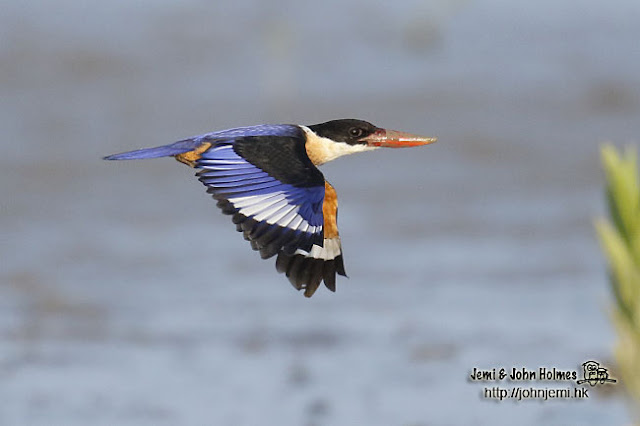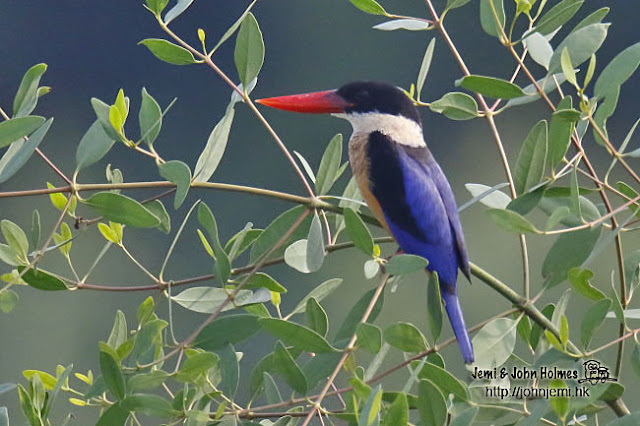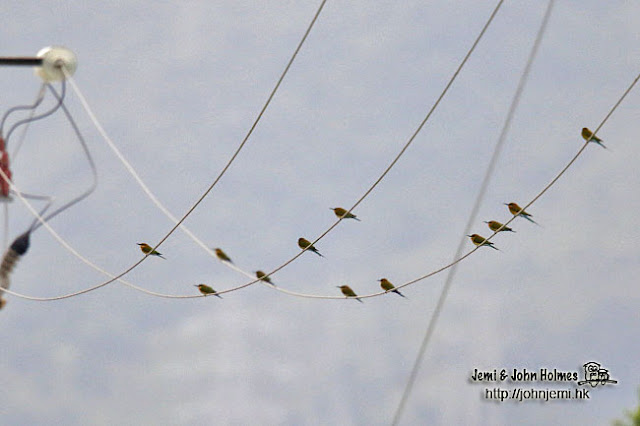They're big, they're gaudy, and their modelling career probably peaked with the publication of "Hong Kong Birds" by Geoffrey Herklots in 1954 - but I still find Black-capped Kingfishers irresistible. Some may stay in HK for the winter, but most are heading further south.
 |
| Black-capped Kingfisher - Halcyon pileata |
 |
| Black-capped Kingfisher - Halcyon pileata |
 |
| Black-capped Kingfisher - Halcyon pileata |
 |
| Black-capped Kingfisher - Halcyon pileata |
 |
| Black-capped Kingfisher - Halcyon pileata |
October is a good month to see Blue-tailed Bee Eaters, and at the start of October I was keenly scanning every power line looking for them, but only found Bulbuls or Black Drongoes.
However on October 11th, at Tsim Bei Tsui there were over thirty; - here are twelve to start with.
 |
| Blue-tailed Bee Eater - Merops philippinus |
The Bee Eaters, many of them juveniles, are strictly "fly-throughs". The scientific name provides a clue to where many will spend the winter.
 |
| Blue-tailed Bee Eater - Merops philippinus |
 |
| Blue-tailed Bee Eater - Merops philippinus |
 |
| Blue-tailed Bee Eater - Merops philippinus |
 |
| Blue-tailed Bee Eater - Merops philippinus |
 |
| Blue-tailed Bee Eater - Merops philippinus |
And finally, here are four passing autumnal raptor species. Raptors, especially juveniles, usually provide hours of ID fun for young and old alike.
 |
| Pied Harrier - Circus melanoleucos |
 |
| Common Kestrel - Falco tinnunculus |
 |
| Amur Falcon - Falco amurensis |
 |
| Eurasian Hobby - Falco subbuteo |
The Kestrel may hang around for Hong Kong's winter, but the others are likely to be long gone by November.....
















Hopefully, the Falcon and the Hobby will find their way to my home land this season. Another nice collection of images.
ReplyDeleteEnvy inducing species as always. Great Kingfisher BIFs..............
ReplyDeleteGreat birds, great photos. I especially love the photo of the BC Kingfisher flying past the Great Egret. I myself have a tough time photographing birds in flight. I am not fast enough on the draw.
ReplyDeleteI am still waiting to get Amur Falcon onto my HK list...Great job!
ReplyDeleteIncredible flight pictures, John. Beautiful and clear. That kingfisher is stunning and I'd be excited to see those raptors too. You did well to get so close.
ReplyDeleteYet more wonderful photos, especially love the BIFs, stunning! Black-capped is still one of my favorite HK kingfishers.
ReplyDeleteThanks for all the comments - you can't go wrong with photos of Black-capped Kingfishers
ReplyDeleteHi John
ReplyDeleteI've just received my Winter 2015 edition of the HKBWS Bulletin and have enjoyed browsing, as always. A sterling effort! The last photo on the inside back page caught my attention - the one labelled 'Pied Harrier', and I see that what is presumably the same individual appears in this blog post. It's a fascinating individual. Despite its superficial similarity to an adult female Pied Harrier, I believe it is actually a young male Eastern Marsh. The thing which sets alarm bells ringing for me is the largely unmarked white underwing, notably the coverts and primaries. An adult female Pied should show a barring in these areas, whereas a male Eastern Marsh has unmarked white underwing coverts and practically unbarred under-primaries. The extensively grey tail is another clue that this cannot be a Pied, but is in fact a male EMH, as is the overall rather bulky body shape and heavy-looking head. We see a few of these in Malaysia, and without photographs they would no doubt be passed off as Pieds.